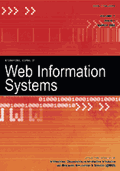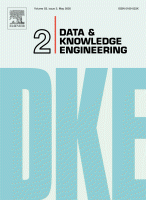Home |
||
| |
 |
International Journal of
Intelligent Information Technologies (IJIIT)
There is growing interest in developing intelligent technologies that enable users to accomplish complex tasks in web-centric environments with ease, utilizing such technologies as intelligent agents, distributed computing in heterogeneous environments, and computer supported collaborative work. The mission of the International Journal of Intelligent Information Technologies is to bring together researchers in related fields such as information systems, distributed AI, intelligent agents, and collaborative work, to discuss various aspects of design and development of intelligent technologies. This journal provides a forum for academics and practitioners to explore research issues related to not only the design, implementation and deployment of intelligent systems and technologies, but also economic issues and organizational impact. Papers related to all aspects of intelligent systems including theoretical work on agent and multi-agent systems as well as case studies offering insights into agent-based problem solving with empirical or simulation based evidence are welcome. IJIIT encourages quality submissions dealing with (but not limited to) the following topics: •Intelligent information
systems development using Design Science principles The International Journal of Intelligent Information Technologies is an official publication of the Information Resources Management Association and published by Idea Group Inc., Hershey, USA (www.idea-group.com). For additional information regarding the manuscript submission and subscriptions, please contact the editor-in-chief at sugumara@oakland.edu. |
 |
International Journal of Web Information Systems The era of web technology has enabled information
and application sharing through the internet. The large amount of
information on the internet, the large number of users, and the
complexity of the application and information types have introduced
new areas whereby these issues are explored and addressed. Many of
the existing information systems techniques and methods for data
sharing, modeling, and system implementation are no longer effective
and therefore need major adjustment. This has stimulated the
emergence of web information systems. While IJWIS covers a broad range of topics, we are soliciting papers that provide a perspective on all aspects of the Web information systems: Web semantics and web dynamics, Web mining and searching, Web databases and web data integration, Web-based commerce and e-business, Web collaboration and distributed computing, Internet computing and networks, Performance of web applications, and Web multimedia services and web-based education. Topics of particular interest for this issue are, but not limited to, the list below: • Metadata and ontologies
|
 |
International Journal of DATA & KNOWLEDGE ENGINEERING Database Systems and Knowledgebase Systems share many common principles. Data & Knowledge Engineering (DKE) stimulates the exchange of ideas and interaction between these two related fields of interest. DKE reaches a world-wide audience of researchers, designers, managers and users. The major aim of the journal is to identify, investigate and analyze the underlying principles in the design and effective use of these systems. DKE achieves this aim by publishing original research results, technical advances and news items concerning data engineering, knowledge engineering, and the interface of these two fields. DKE covers the following topics: 1. Representation and Manipulation of Data & Knowledge: Conceptual data models. Knowledge representation techniques. Data/knowledge manipulation languages and techniques. 2. Architectures of database, expert, or knowledge-based systems: New architectures for database / knowledge base / expert systems, design and implementation techniques, languages and user interfaces, distributed architectures. 3. Construction of data/knowledge bases: Data / knowledge base design methodologies and tools, data/knowledge acquisition methods, integrity/security/maintenance issues. 4. Applications, case studies, and management issues: Data administration issues, knowledge engineering practice, office and engineering applications. 5. Tools for specifying and developing Data and Knowledge Bases using tools based on Linguistics or Human Machine Interface principles. 6. Communication aspects involved in implementing, designing and using KBSs in Cyberspace. Plus... conference reports, calendar of events, book reviews etc. |


